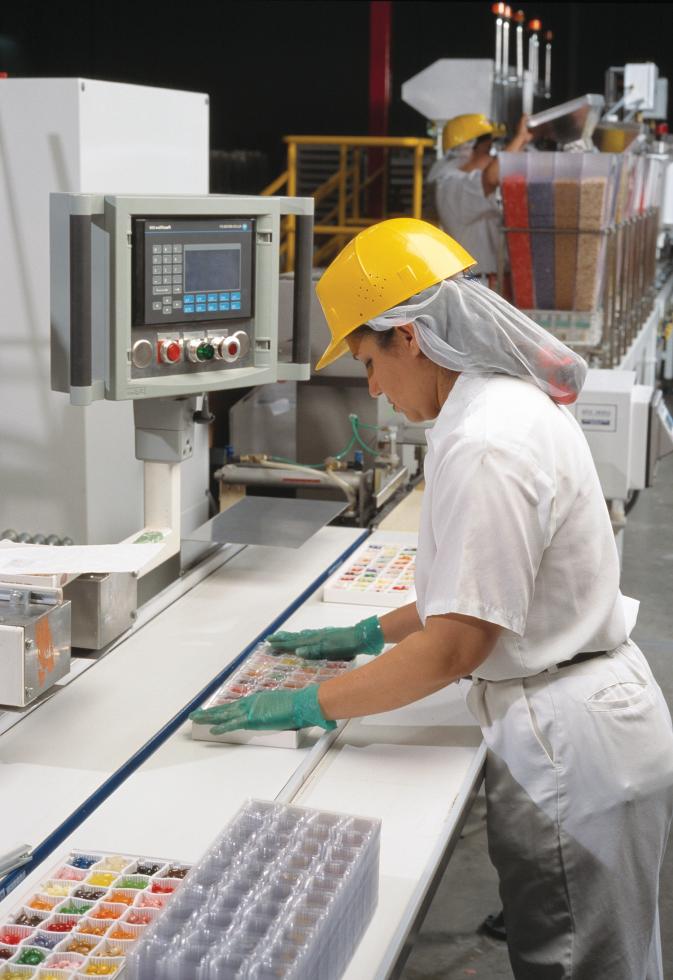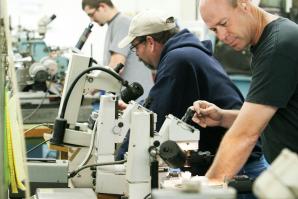The Jelly Belly Candy Co. opened a manufacturing plant in
fairfield in 1986; as of December, it employed 480 workers.
(Photo courtesy of the City of Fairfield)

This summer, the Milken Institute released its second report on manufacturing in California. Seven years the institute sounded the alarm that California was losing its manufacturing edge, the driving force for postwar prosperity from the aerospace industry through high technology. The institute said policy makers should pay attention to the state’s manufacturing decline.
The response from the policy folks was a big yawn. Nothing happened. So for its second report, Milken looked at the results of this inaction. “California has been progressively losing more of its manufacturing employment, particularly high value-added manufacturing, to other states such as Oregon, Texas, Minnesota and Washington,” Milken said.
To analyze what has happened here, Milken looked at seven peer states. It found that these states combined had 2.7 million manufacturing jobs in 2007 compared to 1.5 million in California. But just since 2003, these states have added 62,000 manufacturing jobs while California has lost 79,000. As Milken points out, every manufacturing job creates at least 2.5 other jobs and even more for high-tech.
Now apply these numbers to the state’s fiscal crisis. Those lost manufacturing jobs would have generated $27 billion more in wages and $54 billion more in manufacturing related output. This output would in turn have added several billion dollars in tax revenue to the state’s empty coffers. The simple connection between economic growth and more state revenue seems to evade policymakers of all stripes: Democrats in Sacramento only worry about satisfying their public employee union and environmental interest groups. For Republicans, it’s the anti-tax lobby.
None of them seem interested in making the fiscal pie bigger through economic growth. In its report, Milken recommends “streamlining the regulatory procedure for manufacturers, (and) increasing transparency and accountability in the regulatory process.” There is not the slightest interest in doing that in the Legislature.
Gov. Arnold Schwarzenegger was elected in the 2003 recall specifically to fix Sacramento and balance the budget. But he has hardly lifted a finger to advance economic development — which would bring in more revenue to balance budgets — and in fact has made things worse. Instead of working on job creation policies, he ran off with the global warming crowd and signed Assembly Bill 32, a new set of business regulations to fight climate change.
It seems to have occurred to no one in state government that our own global warming policy will have little effect on the problem (hey, it is global) and might actually make things worse. California remains the catalyst for innovation and entrepreneurship; and it should be apparent that the answer to global warming is new technologies to reduce greenhouse gases. But no, California’s contribution will be new regulations that, over time, drive manufacturing jobs away and impair entrepreneurial innovation.
In its report, Milken recommends “creating a public-private initiative to conduct research, develop new technologies and processes, and commercialize more efficient and environmentally sustainable manufacturing practices.” We had a state agency dedicated to this very thing 15 years ago, but the Gray Davis Administration took away funding for the state Commerce and Trade Agency, and Schwarzenegger has shown no interest in restoring it.
So if an overseas company looking to manufacture in America needs state help with the permitting process, there is no one in California who can offer assistance. That’s not true in other states where there is a helping hand for anyone wanting to build factories and manufacture goods. So should we be surprised that California is losing jobs while our peer states are gaining them?
Because the Legislature and the governor’s office fail to take real interest in manufacturing, this Milken Institute report is likely to draw dust just like the first one.
But California elects a new governor next year, and the draconian budget cuts enacted this year to keep California out of bankruptcy will begin having an impact. So perhaps there is room for new thinking. Certainly voters are furious with Sacramento. They have less faith in the political establishment than at any other time in decades. They showed that by trashing the bipartisan budget balancing measures the Legislature served up in the May special election.
Perhaps they will be more open to a third way between the usual suspects of Democrats and Republicans. Perhaps there is a consistuency out there for what Milken is suggesting: Make the pie bigger for all of California by generating economic development and increased manufacturing with its high-paying jobs.
The debate about California’s future needs to go beyond just raising and cutting taxes. It should focus on the kinds of issues discussed in the Milken report: How do we increase our manufacturing competitiveness and expand jobs, rather than just chase them away?
Tony Quinn is co-editor of the California Target Book, a nonpartisan analysis of legislative and congressional elections.
Recommended For You

Pitching California
It's Kish Rajan's job to sell California to business—so what's his spiel?
Kish Rajan is the director of GO-Biz, the California Governor’s Office of Business and Economic Development. Previously, he was the director of North American sales for SanDisk, was an aid to Phil Angelides during his ’94 run for state treasurer and was a legislative aide to California Sen. Barbara Boxer.

Right to Assembly
Growing manufacturing jobs in Placer County
If a local economy is thriving and healthy, it may have the manufacturing industry to thank. If things aren’t so good, it’s probably because manufacturing jobs are leaving.


